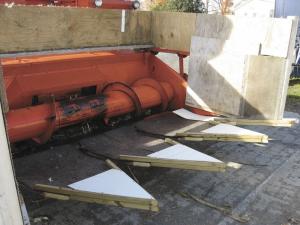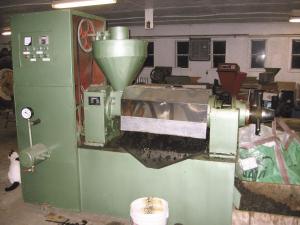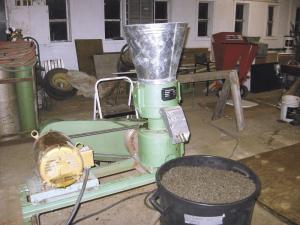2010 - Volume #34, Issue #3, Page #29
[ Sample Stories From This Issue | List of All Stories In This Issue | Print this story
| Read this issue]
DIY On-Farm Fuel Production
 |
 |
 |
"Nobody around here had a sunflower header and we couldn't get sunflower pans to fit older standard combines," says Rainville, a Vermont farmer. "You don't buy a special combine to harvest 30 to 40 acres."
Rainville removed the reel from a model 6660 Case combine. He fabricated V-shaped pans using wood 2 by 4's for frames that he covered with 1/4-in. hard plastic. He also boxed in the header to contain sunflower heads from the 6 to 8-ft. tall stalks. The Case was particularly easy to attach pans to, he says.
"It had angle iron supports underneath the header where I could bolt the pans," explains Rainville. "It only took $13 worth of materials, and they worked great."
Once Rainville had the sunflowers combined, he ran them through a Chinese oil press. The meal was then run through a pelletizer he bought from the same source.
"I read about Chinese presses in FARM SHOW and talked to the farmers who had them," says Rainville. "Mine will do 8 tons of oilseed in 24 hrs. It's great when you need a lot of oil in a hurry."
Rainville works closely with the University of Vermont doing experimental oil seed plots, including sunflower and canola, as well as other crops like wheat and barley. This year he will have more than 3,000 plots on the farm.
A former dairy farmer, he now feeds out heifers with the pelletized oilseed meal and uses the oil to fuel tractors and other equipment for all of his field work. While he has been using biodiesel at a 50 percent level, he plans to move to 100 percent in his tractors this year.
Since installing his Chinese press, the university has bought and installed a smaller, but fully automated German-made oilseed press. While the Kern Kraft press can be set to run 24/7, it will only do about 1,000 lbs. of oilseed in a 24-hr. period. Rainville says his Chinese press does a better job on sunflowers and costs less. However, the Kern Kraft requires less labor.
"The German press takes only about half an hour of labor a day and works with gravity-fed seed," he says.
The university has also installed an automated biodiesel processor from BioPro. "You put the oil in, add the methanol and hydroxide to their compartments and hit a button," says Rainville. "Come back 12 hours later, and it's done."
While Rainville was one of the first in his area to try oilseeds for on-farm fuel, interest is growing. "We started with five of us growing oilseeds, and now there are more than 50 doing so in the area," he says. "Even at $2.40 diesel prices, canola is competitive. Input costs run $135 per acre, and we can harvest $200 worth of straw for bedding and up to 110 gal. of oil per acre with yields of a ton and a half of canola."
Contact: FARM SHOW Followup, Roger Rainville, 124 Line Rd., Alburg, Vt. 05440 (ph 802 796-3292; cra@fairpoint.net).

Click here to download page story appeared in.

Click here to read entire issue
To read the rest of this story, download this issue below or click here to register with your account number.




